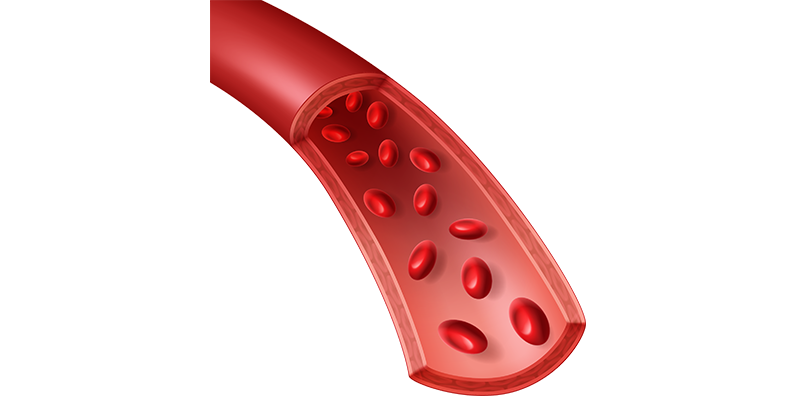About Blood Cancers
Blood cancers develop when abnormal blood cells grow out of control. When that happens, they keep normal, healthy blood cells from fighting off infection and producing new cells. We treat all types of blood cancers, which include leukemia, lymphoma, and myeloma.
Your team will include specialists such as medical oncologists, radiation oncologists, hematologists, and certified oncology nurses. Together, we work to create your treatment plan and help make sure you have the right choices for your type of blood cancer.

Types of Blood Cancers
These types of cancers begin in the bone marrow, blood, and lymphatic system. Each one has unique features and may need different treatments.
Leukemia
Leukemia is a cancer of the white blood cells, which form in the bone marrow. The abnormal white blood cells force out and replace normal blood and marrow cells. More about Leukemia (MedlinePlus.gov).
There are many types of leukemia. Some of the more common ones include:
- Acute lymphocytic leukemia (ALL). Affects the blood and bone marrow and develops quickly.
- Acute myeloid leukemia (AML). Affects the blood and bone marrow with rapid progression.
- Chronic lymphocytic leukemia (CLL). Most often grows slowly. It begins in the bone marrow then spreads to the blood.
- Chronic myeloid leukemia (CML). It starts in the blood-forming cells of the bone marrow before spreading to the blood.
- Hairy cell leukemia (HCL). This is a rare blood cancer that develops in the bone marrow and progresses slowly.
- Myelodysplastic syndromes (MDS). These are related diseases that begin when the bone marrow doesn’t produce enough functioning red blood cells, white blood cells, or platelets.
Lymphomas
Lymphomas develop in a part of the immune system called the lymph system. More about Lymphoma (MedlinePlus.gov).
They mainly fall into two categories:
- Hodgkin lymphoma. It is often diagnosed at an early stage, which makes it one of the most treatable cancers.
- Non-Hodgkin lymphoma. This condition may arise in lymph nodes anywhere in the body. This is why most cases of this cancer are diagnosed at an advanced stage.
Myeloma
Myeloma develops in the bone marrow. It affects plasma cells, which are cells that help keep you healthy. The disease can damage or weaken bones and become painful. More about Myeloma (MedlinePlus.gov).
Other types of bone marrow and blood disease include Myelodysplastic and myeloproliferative diseases.
- Myelodysplastic diseases begin when blood stem cells do not mature into healthy red blood cells, white blood cells, or platelets. This causes fewer healthy cells.
- Myeloproliferative diseases develop when an abnormal number of blood stem cells join into one or more types of blood cells. This causes the total number of blood cells to slowly increase, leading to disease.
Diagnosing Blood Cancers
We use advanced tools and methods to diagnose blood cancers.
- Biopsy. With this test, the doctor takes a small sample of tissue from your body and tests it in a laboratory to look for abnormalities in the tissue cells.
- Bone marrow aspiration and biopsy. The test uses a small needle to remove bone marrow, blood, and a small piece of bone. These samples are examined under a microscope for signs of cancer.
- Complete blood count. This test collects a blood sample and counts red blood cells, white blood cells, and platelets to see if there are abnormalities in the number of cells.
- Lab tests. These include examining blood or urine samples to measure antibodies; testing the thickness of the blood; and measuring the number and percentage of cells in a sample.
- Lumbar puncture (spinal tap). The test takes fluid from the spine in the lower back through a hollow needle and checks it for abnormalities.

Treating Blood Cancers
Hope and healing start with your personalized plan and the latest treatments. You can feel confident knowing we have a complete understanding of what works best for your condition — and the experience to back it up. These are the treatments we will tailor to your blood cancer diagnosis (in alphabetical order):
- Chemotherapy. This treatment can cure or help control cancer and ease its symptoms. Chemo treatments use specialized medicines to kill cancer cells. Our locations provide chemotherapy infusions in comfortable, private bays that are supported by highly trained infusion nurses.
- Immunotherapy. Your immune system protects your body from illness and harmful foreign substances. Immunotherapy is just one of the forms of precision medicine we offer that boosts your body's immune system and helps it recognize and attack cancer cells.
- Radiation therapy. This treatment can be used by itself, with surgery, chemotherapy, or both. Radiation shrinks or destroys cancer cells. Radioactive sources or linear accelerators cause precisely focused, high-energy beams to attack the cells in the area being treated while still protecting healthy tissue. We use image guided radiation therapy (IGRT), stereotactic radiosurgery (SRS), intensity modulated radiation therapy (IMRT), and others.
- Targeted therapy. This treatment targets certain proteins on cancer cells that control how the cells grow and spread. Based on your type of cancer, our medical oncologists can test a cancer cell and its potential reaction to medicine. We test tumors to see if it contains targets and determine if there is medicine available to fight those targets.


